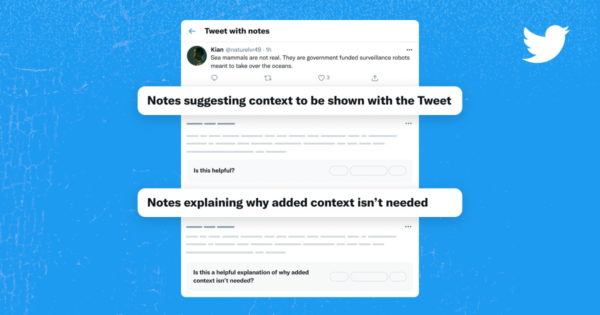
Twitter detailed updates to the algorithm powering crowdsourced fact-checking initiative Community Notes, which was known as Birdwatch in the pre-Elon Musk days.
Community Notes may take on more importance at the platform, as Twitter’s content moderation teams were gutted as part of mass layoffs early this month, followed by a purging of several contractor positions in the middle of the month.
Twitter said in a series of tweets from the Community Notes account, “One of contributors’ top frustrations is seeing and rating low-quality notes. We just rolled out an algorithm update that identifies more low-quality notes, saving contributors time and improving the average quality of notes (and note writers).”
The company explained that while contributors were able to write notes proposing that context be added to a tweet or explaining why a tweet wasn’t misleading and didn’t need the addition of context, the latter type of note generated “noisy” rating data, so Twitter paused scoring those notes.
Its new algorithm update resumed scoring those notes with the aim of identifying more low-quality notes, taking away the ability to write notes from people consistently contributing low-quality notes and improving contributor helpfulness scores with more data.
In response to a question about how the algorithm determined low-quality notes that brought up the potential for censorship, Twitter vice president of product Keith Coleman replied in a tweet, “That is an important question. In the case of Community Notes, ‘low-quality’ equals notes that are found not helpful by a wide range of people, including people who typically disagree with each other. This prevents one-sided outcomes.”
Twitter introduced the Birdwatch program in January 2021, inviting contributors to flag potentially misleading information in tweets and write notes providing context.
In September, the social network detailed a new onboarding process that assigned new contributors who meet its eligibility criteria—a verified phone number from a trusted carrier based in the U.S., as well as a minimum of six months on Twitter, with no recent violations—with an initial Rating Impact score of zero, which they could increase by consistently rating other contributors’ notes and reliably identifying those that are helpful and not helpful.
They could begin writing notes once their Rating Impact score reached five, and Twitter explained that they could continue to boost that score by writing and rating notes, but consistently writing notes that other contributors rated as not helpful would lower their score and potentially cause their ability to write notes to be temporarily locked.
Twitter had roughly 15,000 Birdwatch contributors at the time, and it said it would begin adding about another 1,000 per week
In October, shortly before Musk’s takeover of the company, Twitter said users in the U.S. would begin seeing some tweets accompanied by notes containing relevant information about that tweet that was rated as “Helpful” by Birdwatch contributors, adding that most of those notes would provide additional sources for people who want to dive deeper into the subject matter.
The company said at the time that users would be able to rate the notes they see in order to help Twitter understand whether or not they are helpful.
https://www.adweek.com/media/twitter-updates-algorithm-powering-community-notes-the-project-formerly-known-as-birdwatch/

